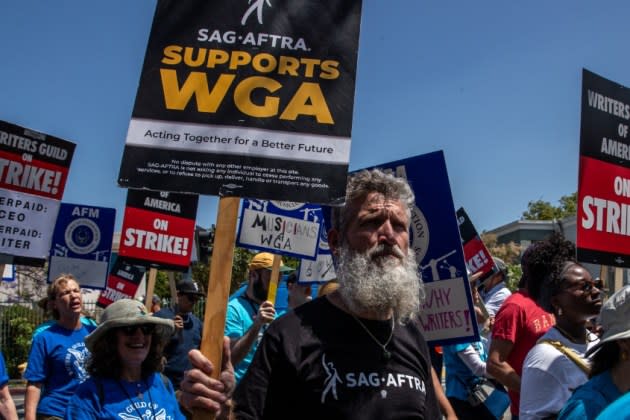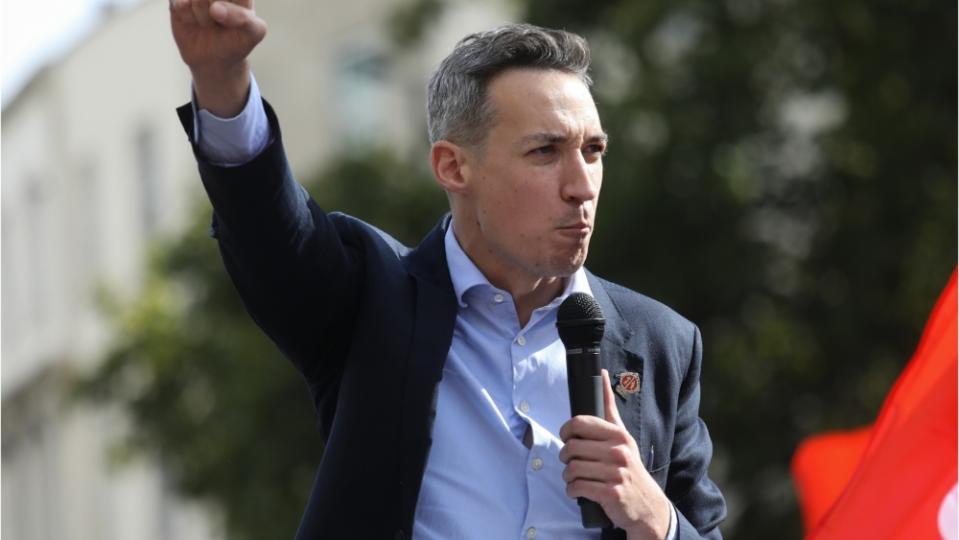How Would a SAG-AFTRA Strike Affect the U.K. Entertainment Biz?

If you ask most people in the U.K. industry how business is going right now, they’ll likely tell you it’s been agonizingly “slow.” It’s meant to be boom time for production, but this summer, the U.S. writers strike combined with a cost of living crisis is brutally squeezing unscripted and scripted projects.
This week, as the clock ticks away on negotiations between American actors union SAG-AFTRA and Hollywood’s collective bargaining agent, the Alliance of Motion Picture and Television Producers, the prevailing thought will be: is all of this about to get much worse?
More from Variety
How SAG-AFTRA Talks Collapsed: 'I Was Taken Completely By Surprise,' Union Chief Says
Ted Sarandos Says SAG-AFTRA Asked for 'Levy' on Every Netflix Subscriber
SAG-AFTRA Alleges 'Bully Tactics' as Studios Suspend Negotiations
A number of British actors Variety has spoken to say they’ve yet to hear from local actors’ union Equity with any guidance about their situation. That’s likely because it’s being worked out in real time. Paul W. Fleming, general secretary for Equity, has been in Los Angeles for discussions with SAG-AFTRA, which is optimistic about its negotiations with the AMPTP. (He’s also visiting New York to meet with theater union Actors’ Equity.)
In a June 23 video update to members, president Fran Drescher said, “We’re standing strong and we’re going to achieve a seminal deal.” The union’s contract will expire at midnight on June 30, though it’s believed that negotiations could extend beyond that date in order to reach an agreement and avoid strike action.
Fleming, who huddles with his American counterparts on a weekly basis, tells Variety he’s been in town to “work out what we can do to support our sister unions in the United States — both the Writers Guild and SAG-AFTRA — and how we make sure the messages from their claim have the best chance for success as possible.”
The London-headquartered Equity has 47,000 members that include actors, singers, dancers, designers, directors, stage managers and voice artists, among others. As the profile of British talent has grown in Hollywood over the last decade, so too has Equity’s power.
Myriad issues affecting American performers are resonating in the U.K. In recent years, concerns over artificial intelligence and self-taped auditions have been just as rife in Britain. “Those are the big things, but also holding a strong position on maintaining that our members get proportionate remuneration from their work and the exploitation of it in new media — those are very, very strong shared positions,” says Fleming. “Honestly, one reads the SAG-AFTRA claim and they are absolutely the same issues we’re discussing with producers in the U.K.”
So, what is the union’s advice to its membership in the event of a U.S. strike? “Whatever happens, there will be a strong conversation between [Equity and SAG-AFTRA],” Fleming assures. “We’ll be making sure that whatever SAG-AFTRA’s position is, it isn’t undermined by our position.”
In the event that talks head south this week, and a strike is triggered, it’s extremely likely Equity will advise its membership to pause all work that’s governed by SAG-AFTRA contracts. The gray area — much like the U.K. situation in the writers strike — will probably involve performers who are both Equity and SAG-AFTRA members with non-SAG-AFTRA contracts in place with “struck” companies, such as Warner Bros. Discovery or Netflix.

In the U.K., the Writers Guild of Great Britain provided emergency advice to members about this exact situation, which is increasingly common as studios and streamers have established overseas offices in order to grow international productions. The deal so far has been that existing writing work can continue, but new work is discouraged.
But the work of actors is, in many ways, more immediate than the work of writers. One senior talent agent in the U.K. with high-profile clients who are both Equity and SAG-AFTRA members says the optics of continuing any work while others are forgoing their livelihoods will be unsavoury.
Speaking on condition of anonymity, she says an actors strike will be “really tough” on the U.K. “Everyone is at risk of being exposed if they don’t stand in solidarity, so no matter if you are SAG-AFTRA or not, I imagine there will be a level of pressure.”
One well-established European actor who’s a SAG-AFTRA and Equity member hinted at the discomfort faced by the acting community during the writers strike: “The only thing that won’t be complicated [if SAG-AFTRA strikes] is that we’re then on strike, and don’t have to show up for work. [With the writers strike] some productions that are still running have had to bring actors in the back door because, legally, we’re not allowed to stop working. It’s been awkward and uncomfortable.”
Max Rumney, deputy CEO and director of business affairs for British producers’ trade org Pact, agrees that an actors strike “could be more comprehensive than the writers strike.”
“On every production, you may have one to two writers [in the U.K.], but you can have dozens of actors,” says Rumney. “If one of them is striking, that could bring a production to a standstill.”
Yet Rumney notes that while there will be “huge ramifications” for U.S. studio films or TV shows shooting in the U.K., productions for local British broadcasters or independent films should be able to continue because most don’t employ SAG-AFTRA actors. “The issue arises when you have an actor who’s a member of both Equity and SAG-AFTRA,” says Rumney. “If you’re a British producer filming in the U.K. using Pact-Equity contracts, it’s not an issue.”
One of the key questions the exec is fielding surrounds the waiver for SAG-AFTRA’s Global Rule One (GR1), which allows U.K. producers to use guild actors for local productions while waiving the GR1, which outlines that “a SAG-AFTRA member must always work under a union contract around the globe.”
“SAG-AFTRA have granted those for decades,” says Rumney.
On its website, the union has simply said it anticipates that “a strike order will include work on overseas productions under the Codified Basic Agreement and Television Agreement, including work done under a GR-1 memorandum of agreement.” SAG-AFTRA did not respond to Variety’s request for further clarification by press time.
As for whether Equity can actually call a strike in the U.K., the union won’t be able to strike in solidarity as it’s an independent union in a different jurisdiction; however, it is currently “preparing for a claim” around discussions with producers’ org Pact and the all-important TV contract, which also applies to streaming and was last updated in 2021. A negotiations timetable is being worked out, and will fall within the next 12 months. It follows the union’s new agreement for the West End, in which the org negotiated a 16.7% increase to minimum rates within 24 months (just shy of its 17% target, and considered a major success).
“It’s a significantly more complex process to achieve a strike mandate in the United Kingdom,” says Fleming. “We are prepared to use those sorts of approaches, but we’re nowhere near that position when it comes to the negotiations.”
Pact’s Rumney adds that the producers’ org has a “collegiate attitude” and “good working relationship with Equity.” Says the executive: “Our agreements operate differently to the U.S. and are based on different assumptions.”
Indeed, one question that will soon face both parties in a challenged economic climate could be whether the U.K. industry will be willing to strike if it came to it. “It’s not easy at the moment because of the cost of production and materials,” says Rumney. “Engaging people has decreased substantially.”
Here, Equity’s Fleming encourages members to keep the bigger picture in mind.
“What people have to ask themselves is, what is the short term and the long term? These are big existential questions that we’re all looking at: AI, pay, the industrial relations framework itself, distribution, secondary payments.”
“If you want deals to be as good as they possibly can be, that relies on SAG-AFTRA deals and Writers Guild deals being the best as they possibly can be. And that is painful,” says Fleming. “I’m in no way undermining how painful that is, but we don’t cross picket lines either physically or virtually, because it’s not in your interest to do so.”
Best of Variety
Sign up for Variety’s Newsletter. For the latest news, follow us on Facebook, Twitter, and Instagram.


